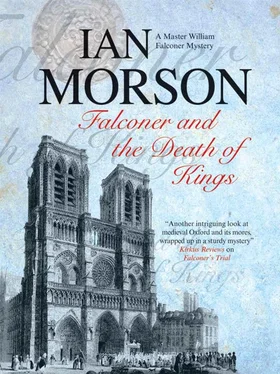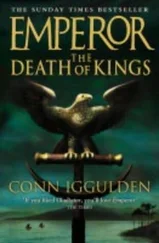Ian Morson - Falconer and the Death of Kings
Здесь есть возможность читать онлайн «Ian Morson - Falconer and the Death of Kings» весь текст электронной книги совершенно бесплатно (целиком полную версию без сокращений). В некоторых случаях можно слушать аудио, скачать через торрент в формате fb2 и присутствует краткое содержание. Год выпуска: 2010, Издательство: Severn House Publishers, Жанр: Исторический детектив, на английском языке. Описание произведения, (предисловие) а так же отзывы посетителей доступны на портале библиотеки ЛибКат.
- Название:Falconer and the Death of Kings
- Автор:
- Издательство:Severn House Publishers
- Жанр:
- Год:2010
- ISBN:нет данных
- Рейтинг книги:5 / 5. Голосов: 1
-
Избранное:Добавить в избранное
- Отзывы:
-
Ваша оценка:
- 100
- 1
- 2
- 3
- 4
- 5
Falconer and the Death of Kings: краткое содержание, описание и аннотация
Предлагаем к чтению аннотацию, описание, краткое содержание или предисловие (зависит от того, что написал сам автор книги «Falconer and the Death of Kings»). Если вы не нашли необходимую информацию о книге — напишите в комментариях, мы постараемся отыскать её.
Falconer and the Death of Kings — читать онлайн бесплатно полную книгу (весь текст) целиком
Ниже представлен текст книги, разбитый по страницам. Система сохранения места последней прочитанной страницы, позволяет с удобством читать онлайн бесплатно книгу «Falconer and the Death of Kings», без необходимости каждый раз заново искать на чём Вы остановились. Поставьте закладку, и сможете в любой момент перейти на страницу, на которой закончили чтение.
Интервал:
Закладка:
‘Is it bad news, William?’
Roger’s solicitous enquiry brought Falconer back to the present.
‘In a way. It marks the end of the enquiry I was following. My report to Edward — when he deigns to return to these shores — will have to be incomplete. Still, let us not dwell on that. You are returned to Oxford. Will you reopen your tower at Grand Pont?’
Falconer was referring to the tall building resembling a watermill that stood beside the river and the main bridge over it to the south of Oxford. The Franciscan friar had built quite a reputation for black magic when he had last occupied it due to late-night experiments within its upper room. Bacon shook his head.
‘I fear it is too damp and crumbling to be inhabitable. Besides, I have to exist under the watchful eye of Father Superior in the friary itself until I have proven myself to be totally innocuous.’
‘Quite some time, then.’
The three men laughed, but there was a hollow ring to the jollity expressed by two of them. Bacon would be under surveillance because of his beliefs, and Falconer had been deliberately thwarted in his investigations into the death of Richard of Cornwall. Only Thomas Symon was unencumbered by the pressure from those around him. Falconer hoped that his natural optimism would not also be crushed as that of his companions had been. They each took leave of the other, with Bacon returning to the Franciscan friary just outside the southern walls of the town, and Thomas to Colcill Hall, next to Aristotle’s, where he would temporarily reside before finding his own teaching post.
Falconer sat alone in his solar, staring at the message from Paris. He felt there was something hidden in the words of Guillaume’s missive. But rack his brains as he might, he could not see it. He lay back on his bed until he heard his charges down below in the hall leaving Aristotle’s for a night of roistering in the low taverns of the town. Some of his students were too poor to buy anything but the cheapest watery ale. But Oxford offered them nothing other than inns and the bawdy houses of Grope Lane to pass the hours of a long summer’s evening, and beer was cheaper than a whore. They would come back even poorer and have sore heads in the morning, and they would not have learned a lesson, doing it all over again the next night. Falconer remembered his own student days in Oxford and then Bologna. He must have been a disappointment to his friends, for he would prefer to study a text by Aristotle than drink with them. But he had no more money then than he had now. Yet what he did have was a fierce determination to transcend his background as an orphaned farm boy funded at the university by a local priest. He knew nothing of his father other than the name he inherited, and little about his mother other than as a pale, drawn face that had disappeared from his knowledge when he was a small boy. The priest had been a severe presence in his young life, giving him no love, and Falconer learned his distrust of the Church from that time. He had been very surprised that the priest had eventually paid for his studies. But all that had been going on forty years ago. Now he had other charges in his care, and he would make sure they were brought up right. Including letting them get drunk now and again.
As silence descended downstairs, Falconer became aware of the creaking of the old timbers of the house. And of his own solitude. He thought of Saphira only a few minutes’ walk away in Jewry. Convincing himself that he should consult her about Guillaume’s letter — that she would see through the text to the core of it — he scooped it up and went out into St John Street. Avoiding the already noisy taverns lining Shidyerd Street and Grope Lane, he crossed Vine Hall Lane and hurried down the dark narrow alley of Jewry Lane. Saphira’s house was just across Fish Street, and he let himself in. As he quietly closed the door, she called out from the back of the house.
‘William. I thought you might come. I have just taught Rebekkah how to make charoset. We are in the kitchen.’
Used to Saphira’s acute hearing and uncanny way of knowing his every move, Falconer made his way to the rear of the house. In the kitchen, sectioned off in the proper Jewish way, stood Saphira and her servant girl. Both had their sleeves rolled up, and Rebekkah had something stuck to the tip of her nose where she had rubbed it as she worked. Saphira spotted it and wiped it off, causing the girl to descend into a fit of the giggles. Sternly, Saphira told her she could go home now, as she would no longer be needed. Rebekkah looked at Falconer and started giggling again, before running off. The slam of the front door announced her departure. Saphira sighed.
‘One day I will teach her to be quiet in all things. Now sit down, William, and eat while you tell me what you have come here concerning.’
Falconer grinned and took a wooden spoon and dipped into the bowl of the delicious-looking dark concoction. He swallowed the sweetness and enquired what it was made of.
‘Nuts and apples chopped up, cinnamon, sweet wine and honey. The honey is for you, as the great Maimonides says honey is good for old people.’
Falconer took a swipe at her with the sticky spoon. But she was too quick for him, and he contented himself with taking another big helping from the bowl. Relieved to be back in favour with Saphira, and with their former relationship restored, he produced the letter and passed it over to her.
‘What do you make of this?’
Sitting across the table from him, she read it by the light of the candle that stood between them. She sighed.
‘Odo was your main hope for enlightenment about Richard’s death, wasn’t he?’
Falconer nodded.
‘Yes. And I have once again spoken to Sir Humphrey Segrim since returning home. He tells me the same story. Of seeing the Templar sneak out of Berkhamsted under cover of darkness on the very night Richard died. Why would he have done that other than because he had killed him?’
‘Did you reassure Segrim that Odo hadn’t been aware of his presence in Berkhamsted also on that night? That that could not then have been the reason Segrim’s wife Ann was killed — as some form of warning?’
‘Yes, he now accepts that he was not unwittingly the cause of her death.’
‘Good. Now tell me again what Odo told you when you spoke to him in the Templar prison.’
Falconer closed his eyes in concentration, picturing that horrible cell and the ragged skeleton that was all that was left of the once-strong and powerful Templar. He could see again how the man had been chained down to the floor apparently without the strength to lift up his burden. He strived to recall the words Odo had spoken.
‘He said he did go there to kill Richard at the behest of the de Montforts. He explained that he was King Henry’s brother after all, and what he called that same nest of vipers. Then he said… that when he had got there, he found he had no need to do anything. That God would not punish him for that death.’
Falconer opened his eyes and looked at Saphira.
‘I took him to mean that Richard’s stroke had already done that for him. But now I think he intended me to know that he had been beaten to it. That someone else had killed Richard, who up to then had apparently survived the stroke quite well.’
Now something else was trying to wriggle to the surface of Falconer’s mind, a piece of information Saphira had almost caused to surface. She looked at the letter again.
‘I wonder why he added the line at the end about praying for Edward’s success?’
‘I suppose because it is a formal letter, not a personal one. That is what I found odd in the first place. It is so unlike Guillaume.’
‘But now he is Grand Master of his order, he has so great a responsibility that personal friendships may not survive it. It is also odd that he says he prayed for Odo’s soul, and that he thought he was now free. Is it not a sin in Christian eyes to commit self-murder?’
Читать дальшеИнтервал:
Закладка:
Похожие книги на «Falconer and the Death of Kings»
Представляем Вашему вниманию похожие книги на «Falconer and the Death of Kings» списком для выбора. Мы отобрали схожую по названию и смыслу литературу в надежде предоставить читателям больше вариантов отыскать новые, интересные, ещё непрочитанные произведения.
Обсуждение, отзывы о книге «Falconer and the Death of Kings» и просто собственные мнения читателей. Оставьте ваши комментарии, напишите, что Вы думаете о произведении, его смысле или главных героях. Укажите что конкретно понравилось, а что нет, и почему Вы так считаете.












